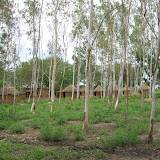
I'm back in Bamako after an incredible hike through Dogon country.
We took the 12 hour bus ride up to Sevrae and spent the night there. We ate ouijila, a huge ball of dough in curry like sauce, surprisingly delicious and a lovely deviation from rice and peanut sauce. The next day we headed out to Sam's village in Sanga. As we bounded through the sandy road, the beige sandstone huts reminding me of Jerusalem, we were accosted by the pleasant aroma of chives, one of their primary sources of income. The kelly green fields were quite a contrast to the sandy mountains, the only vegetation besides the tall thick baobab trees stubbornly pushing through the rocks, their bulbous fruit hanging off the almost bare branches like macabre Christmas ornaments. We all teemed with jealousy as we climbed up the cliff to get to Sam's house, located on a summit overlooking the green chive valley and streams, the
mountains looming in the distance. We slept on the roof and woke up each morning up to dusty sunrises.

We spent a few days in Sanga, climbing our way over to the marketplace where the women sold dyed indigo fabrics, mangoes and wood carvings. The Dogon mask festival was beginning, and it was strange feeling like a tourist as we bumped into groups of westerners. While officially Muslim, most Dogon people still hold fast to their traditional animist beliefs of spirits which they call "genies." Many of the houses had different mud decorations on their roofs, signifying each person's profession: medicine man, goat hunter, clothmaker. We visited the house of the "Oldest Man," who acts as an arbiter for disputes among villagers. The low ceilings prevented any man from standing up so that no man is above another, even in the heat of an argument.

Christmas night we watched a dance competition. Men and women in blue indigo robes spun and danced with the fury in the middle of a crowd of spectators. Still, it felt limp in contrast to the drum circles in my village, maybe less inspired in front of the crowd of spectators. Or maybe I just miss my village. Afterwards we had a huge Christmas dinner that Sam and her host family made at the Mayor's house, complete with a roasted goat on a huge spit, and millet beer. After dinner her villagers surprised us with a welcoming dance. Each quartier of the village presented themselves, dancing in line to the persistent beat while playing their wooden flutes. As they reached us they began to crouch down, holding a medallion of mirrors and white tile. Finally they would end up on their knees, offering the plate to us as everyone in the circle shook their hips and sang. After each neighborhood went they began to pass the medallion to each of us, and we followed suit in presenting ourselves to the villagers.

The next day we began our three-day hike. It began with a steep climb down the mountain, where Malian adolescents rushed to help us down the gaping drops and slippery rocks. We continued on to some of the villages in the cliffs. Each village seemed piled vertically on the side of the mountains, at incredible heights for daily hour long trips to get to water or food. Its amazing what people can get used to. Centuries of isolation from the surrounding cliffs with little water has proven the endurance of the Dogon people. Our guide explained that these villages were located among the higher cliffs where they could see approaching tribes that threatened to steal their goats or children. As we entered each village we were accosted by long-legged Malian children, their faces pale with the desert dust. Divide and conquer they would, following us with their well rehearsed French phrases asking for very particular items: "Monsieur BonBon?" (Mr. Candy?), "Cava Bidon?" (How are you, water bottle?), or "Madame Bici!" (Mrs. Pen!). After almost six months in our villages, we've become a bit jaded with the these children, after all we have our own village kids to take care of! And we're all more concerned about their protein intake then their sugar. Although we were happy to pass off our empty water bottles. We passed the various sacrificial spots, where goats would be killed for good health, or a potion of millet and baobab fruit are offered to increase the town's fertility. After 10 kilometers of hiking up and down the mountain we stopped exhausted for lunch, all 16 of us passing out on concrete slabs immediately afterward. We woke ourselves up for another 5k walk through the thick sand to our hotel. The church behind us was having their service - singing and dancing for hours. We slept on the hotel roof, freezing in the desert air.

The next day, despite our aching legs and blistering feet we headed out again. We began to feel better as we climbed, breathing the clean air. After passing a few villages on the way we reached the old Telem villages, which are roundish irregular stone dwellings carved into the side of the mountain. Its no wonder that the Dogon tribe, who overtook the Telems, believed that the Telems could fly when looking impossibly high homes on the almost vertical rockcliffs. The Dogon now use those cave-like dwellings as burial places, using rope to lower the bodies from the higher cliffs into the chambers. At last we made it to the mountain peak and sat watching the sweeping panoramic of the plateau below us.
Incredible. But I can't wait to get back to my village. I miss my home.







